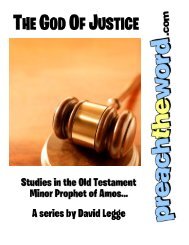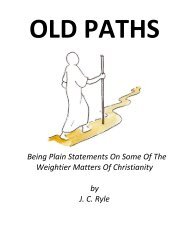The Sinfulness Of Sin - Preach The Word
The Sinfulness Of Sin - Preach The Word
The Sinfulness Of Sin - Preach The Word
Create successful ePaper yourself
Turn your PDF publications into a flip-book with our unique Google optimized e-Paper software.
<strong>The</strong> <strong><strong>Sin</strong>fulness</strong> <strong>Of</strong> <strong>Sin</strong>Ralph Venning4. <strong>The</strong> law has become as a schoolmaster to us (Galatians 3.24). We wouldscarcely ever have looked at Christ had not the law whipped and lashed us like asevere school-master. For this, not to exclude other meanings, is as I conceive it,chiefly the meaning of this text. <strong>The</strong> law kept us in awe and bondage by its severityuntil Christ came. Compare this text with Galatians 4.1-3): '<strong>The</strong> heir, as long as heis a child, differs nothing from a servant but is under tutors and governors... so wewere in bondage.' To be under tutors is the same as to be under a school-masterand that is to be in a condition of bondage. Many go to school with an ill will, forthey go to the rod, the whip, to bondage, to fear and torment. <strong>The</strong> law doesnothing but frown upon us, gives us hard tasks and lashes us for not doing them,till Christ comes or until we come to Christ, just as the Egyptians did to theIsraelites (Exodus 5.14). <strong>The</strong> law is the state of bondage and fear; the verychildren are all subject to bondage through fear of death (Hebrews 2.14-I5).This shows the sinfulness of sin, that it made the law such a dread and terror to us.For so it is to all till Christ come, who is the end of the law for righteousness(Romans 10.4). He takes away the terrors of the school-master by taking us intothe University of a higher and better state, that of believing on him forrighteousness. By this we come to have a spirit, not of fear, but of power, of love,and of a sound mind, as St. Paul says (2 Timothy 1.7).5. <strong>The</strong> law silences man from making any complaint, however great the judgmentof God upon him. Mark what and to whom and to what end and purpose the lawspeaks: that every mouth be stopped (Romans 3.19). All the world must be silentwhen God speaks judgment, for all are guilty. If living man complains he has hisanswer soon and in short: it is for his sin (Lamentations 3.39). <strong>The</strong>re is no room forone who has sinned to complain when he is judged--a sinner and yet complain! O, Iam punished, he says; yes, it is for sin--now this stops his mouth. Man has noreason to enter into judgment with God when God enters into judgment with man.What a wicked thing is sin, which has brought man into such a condition that hecannot speak one word for himself! If he were to open his mouth the law wouldstop it by saying to him, Thou hast sinned. <strong>The</strong> law tells man that he is withoutexcuse and therefore it is in vain to plead. Everything on this side of hell is mercy,for it is the Lord's mercy we are not consumed; and hell itself is just judgment.Under this or that, any or all judgment, man under the law has no cause tocomplain. He must be silent for he has sinned.6. <strong>The</strong> law leaves a man without hope. When once it has passed sentence on aman, there is no reversing it by the law. Hope is one of the last succours, and whenit fails the heart breaks and sinners are broken-hearted. Christ came to savesinners and to heal the broken-hearted, that is, men without hope (Isaiah 61.1),men who are in a desperate and despairing state. <strong>The</strong> law condemns without mercy(Hebrews 10.28); it leaves no place for hope from it. No matter how many petitionsyou present it with, and seek a pardon with tears, yet the law is inexorable. <strong>The</strong>sinner is cursed and shall be cursed, says the law. Now if there is to be anyreprieve or hope of pardon, that comes from the grace of heaven's prerogative,which is above the law. This can revoke and disannul its sentence, indeed bestowblessing where the law pronounced a curse. But the law itself admits of no altering;it is like that of the Medes and Persians, peremptory and unalterable. What I havewritten, I have written, says the law.81














